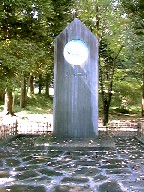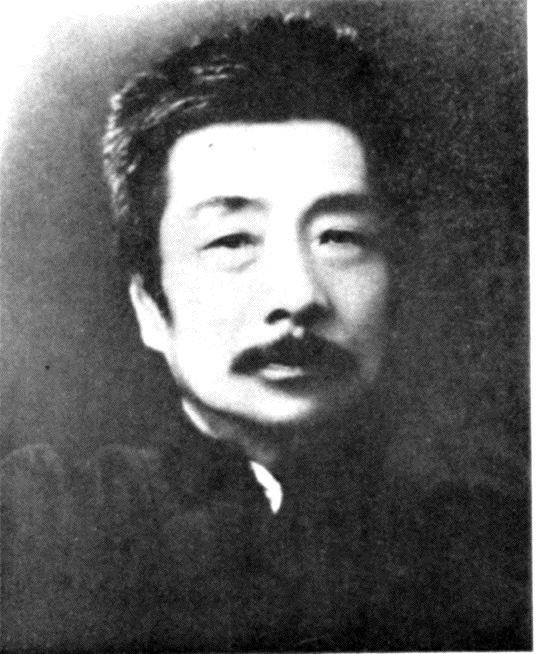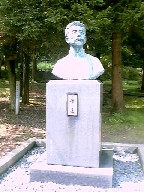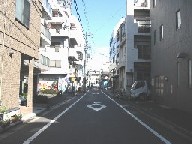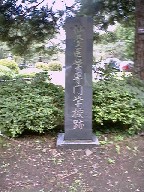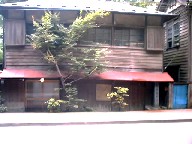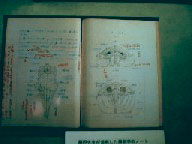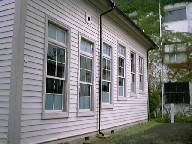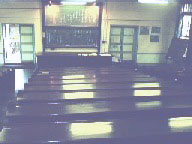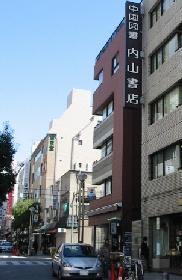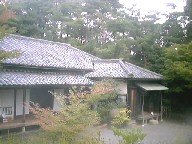Lu Xun,a doctor of mentality.In spite of being trodden on the territory by European powers,this overconfidence continued to expand, based on the Confucian thoughts and a rigid thought that all cultures were originated from China. Lu Xun revolved to be a doctor of such a mentality. It happened at the magic lantern room of Tohoku University in Senday,Japan.
Lu Xun,his real name Zhou Shuren was born in Shaoxing on September 25, 1881. Shaoxing was the place famous for strong liquor and its former name was known as the place of revenge in the period of warring states. He begun to write novels at the age of 38. His name Lu Xun was interesting name combining the meaning of smartness and dullness. Zhou Family was distinguished because many members had passed official examination but his father couldn't pass the preliminary examination of it. His father died of tuberculosis at the age of 36 when Lu Xun was 15 years old. After his father died, Zhou family rapidly had fallen. After that, he was left in his relatives' charge and struggled to learn in a military school which had given him Western style education. He was stimulated by Western studies,he resolved to go to Japan which had already completed Meiji Restoration and won the Sino-Japanese War. Lu Xun went to Japan from Nanjing with the aid of Chinese government in March 1902. At first,he entered Koubun Gakuin School which was a preliminary school for Chinese students in Ushigome,Tokyo. He went sometimes to secondhand bookstores and Qing Students' Hall in Kanda. About this time,he came to think that the Manchurian should be expelled from palace and Government by Chinese alone should be established,and that Western studies was to be introduced through studying from Japan. And Lu Xun made a serious decision.He had his hair in Manchurian style cut because this hair style was a symbol of yielding to Qing dynasty. Among Chinese students, the voice of overthrowing Qing dynasty and uprising for revolution were getting louder. Lu Xun met Sun Yat-sen and formed "Light Revise Socety" together with students coming from the same homeland as his. In 1904,Lu Xun graduated from Koubun Gakuin School,and Qing dynasty ordered him to study in Tokyo Engineering University, but he refused it and went to Tohoku district to study in Sendai Medical School. He had given to his classmates an impression as a silent and serious man in those days. Some day,a crucial incident happened to Lu Xun. In the class of bacteriology,in the slide of magic lantern,he watched the scene of Chinese men arrested and shot to death by Japanese soldiers in the time of Ruso-Japanese War. At this time, Japanese students shouted "Banzai Banzai",but Chinese people looking the scene in the slide hadn't expressed any anger or sorrow, despite their comrades were about to be killed.They looked the scene outmindedly. Facing with the event,Lu Xun felt something more than sorrow,shame,and angry spreading in the depth of his mind. Lu Xun convinced that it was necessary to cure the disease of nation rater than phisical disease as a doctor,and he decided to take literature as a means to be useful for changing the mentality of Chinese people. There was another matter unforgettable for him. It was Professor.Fujino Genkurou who instructed Lu Xun in his days of Sendai Medical School. He always placed Professor Fujino's picture on his desk and hadn't forgotten his favor. In March 1906,Lu Xun had once left Sendai for his marriage and returned to Tokyo and begun to devote himself in writing a literature. Cooperated by his brother Zhou Zuoren,he published novels and became involved in literature steadily. He retuned to China in July 1907,lectured in many schools,but resigned them. In April 1918 he contributed "A Madman's Diary"to the radical montly "New Youth" published by Chen Du-xiu in 1918,find a means of a life in writings and published new novels such as "Home Village"and "The True Story of Ah Q" one after another. <Lu Xun's footstep in Japan>
Lu Xun wrote novel "Madman's Diary", being conscious of the custom of man-eating. But the essence of "Madman's Daiary" is not only man-eating. It is more serious than people knows about the custom very well that they never talk about it as if they promised each other tacitly. Why did Lu Xun make the hero of the novel "madman"? If Lu Xun made a loud voice about the unknown truth to the people, they would made fun of him and recognize him as a madman. Such a solitude of Lu Xun is included in the novel "Madman's Diary". The hero Ah Q of "The true story of Ah Q"was simply a vagrant rather than a peasant. He couldn't even write his own name in Chinese character. But he devised the way of overcoming being always despised.That is the way he declared his triumph to his opponent one-sidedly only in his mind. The way what Ah Q take is the same as the way of the China taking toward European counties and America. In spite of being defeated by European and American powers, Chinese people couldn't get out of Sino-centrism,and indulged in the superiosity over the powers one-sidedly. Through describing a vagrant called "Ah Q" with a servile spirit,Lu Xun prosecuted the servile spirit which most Chinese held in those days. Lu Xun was not only a man of pen. When the battle between National Party's army and Duan Quirui allied with Japan in March 1926,the citizens in Beijing held a protest meeting to protect the National Party's army, but dozens of them were killed by guard soldiers. Some of them were the students of the University Lu Xun taught,the arrest warrant for Lu Xun was also issued and he could not help living in escape. In April, the cabinet of Zhang Zuolin was inaugurated, but reactionary forces became strong,he left on 18 August,and became a professor in the Department of Literature of Amoy University. He left the university and moved to Guangzhou where he was invited to the Sun Yat-sen University. But before long,after the April First coup deat,the storm of anticommunism was blowing and about 40 students were arrested in Sun Yat-sen University as well. Lu Xun made every effort to save those students but couldn't gain an approval because the faculty were inclined to the National Party. Lu Xun resigned the University after three months and was involved in the edifying the magazine "Wild Grass". In October 1927,he moved to Shanghai with his lover where he would live to death,and spent a lot of times to dispute with his opponents. Lu Xun entered an organization led by communist party and was oppressed by National Party. So he had to change his name and address in order to hide hmself. In Shanghai,it was immideately after the anticommunism coup de-tat in full scale, and severe oppressions were about to be exerted to the people of the left wing. In January 1931,his comrades of communist were arrested in unison at the time of a secret meeting, he made effort to save them but failed,and 23 people including young novelists were executed to death. In September 1931,Manchuruan Incident happned,not only National Party but Japanese Army oppressed him,but he had taken an attitude of resistance without budging an inch. However,various struggles had undermined his health and finally he died on October 18,1936 at the age of 56 years old. Lu Xun was dead,but his mind was inherited by many people and became a driving force of racial revolution. Lu Xun had opened the door of new ages of China through literature. E-mail to Yoshimura Naohiro. |

